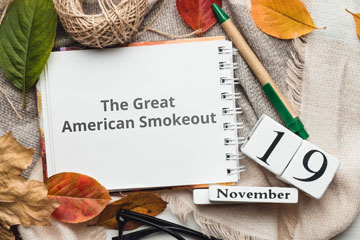The American Cancer Society has been hosting the Great American Smokeout, an annual intervention event on the third Thursday in November, for more than 40 years. In 2020, the event will be observed on November 19. It provides an opportunity for people who smoke to commit healthy, smoke-free lives not just for a day, but all the year round. It aims to motivate individuals, healthcare providers, businesses, community groups, and others to use the date to make a plan to quit smoking, or a plan in advance and begin a smoking termination plan on the day of the event.
The idea of the Great American Smokeout began with an event in Randolph in 1970 at which Arthur P. Mullaney asked people to surrender smoking for a day and contribute the money they spent on cigarettes to a high-school scholarship fund. This event made many public areas and work areas smoke-free, protecting non-smokers and supporting people who smoke who want to quit. It has helped to drastically change Americans’ attitudes about smoking and led to community programs and smoke-free laws that now save lives across the country.
Smoking is the single largest preventable cause of illness and death in the world. According to cancer.org, about 32.4 million American adults still smokes cigarettes. Every year, smoking causes approximately 480,000 deaths and more than 16 million Americans live with a smoking-related disease. Some people smoke more heavily and suffer from smoking-related cancer and other diseases. No matter what your age is, or how long you have been smoking, quitting improves your health immediately and in the long-term.
The Benefits of Quitting Smoking
- Your heart rate and blood pressure will drop 20 minutes after quitting.
- The carbon monoxide level in your blood will come back to normal 12 hours after quitting.
- Your lung function and circulation will improve 2 weeks to 3 months after quitting.
- Coughing, shortness of breath, and risks of infection decrease 1 to 9 months after quitting.
- 1 year after quitting, excess risk of coronary heart disease is half and heart attack risk drops dramatically compared to someone who smokes.
- 5 years after quitting, your risk of cancers of bladder, mouth, throat, and esophagus is reduced to half; risk of cervical cancer and stroke risk falls.
- The risk of dying from lung cancer is reduced to half compared to a person who still smokes; risk of pancreatic and larynx cancer decreases 10 years after quitting.
- 15 years after quitting, your risk of coronary heart disease is the same as that of a non-smoker.
Other benefits of quitting: foods taste better and sense of smell returns to normal, your teeth and fingernails stop yellowing, and you smell better and look better. Also Read: Quitting smoking will prevent premature aging, gum disease, and tooth loss.
Quitting smoking is not easy, but it is possible. It takes time, commitment, support, and a plan. It is strongly advised that you use proven cessation methods, like counseling and prescription medication, to stop smoking. Here are some self-help tips:
- Make a list of reasons to quit. It may be personal reasons like to protect your family from secondhand smoke, reduce the chance of lung cancer, heart disease, and other health conditions.
- Your brain is addicted to nicotine, so you will go through withdrawal. Ask your doctor about the methods that can help you like medication, counseling, etc.
- When you stop smoking, headaches can occur and affect your mood. Nicotine Replacement Therapy (NRT) can help with this. Studies show that nicotine gum, patches, and lozenges improve the success chance if you are in a plan to quit smoking.
- Tell your loved ones that you are trying to quit smoking they will encourage you to keep going.
- Depending on behavioral therapy can help you identify and stick to quit-smoking strategies.
- You can engage yourself in activities like exercise, spending time with non-smoking friends, hearing favourite music, making time for a hobby, anything that helps you this time.
- Try to limit alcohol when you first quit, because it is hard to not smoke when you drink. If you smoke after meals try to do something else like chewing gum, texting a friend, taking a walk, or anything.
- Dump all your ashtrays and lighters. Wash your clothes and clean anything that smells of smoke.
- Maintain healthy diet by eating a lot of fruits, whole grains and vegetables.
- Save the money you spent for cigarettes and donate it for a good cause or use it to reward yourself.
- Whenever you have cravings, think about the risk of developing cancer in the lungs, larynx, mouth, sinuses, pharynx, bladder, esophagus, or anything that helps or motivates you to not smoke.
Always remember it is not easy to quit smoking, but you can do it. It’s never too late to stop the use of tobacco. Let this day be your day to start the journey towards a smoke-free life. Utilize this event to encourage and support yourself and others to increase the chance of success by initiating a plan to quit smoking. Help yourself and others to reduce the risk of cancer and lead a healthy life.
